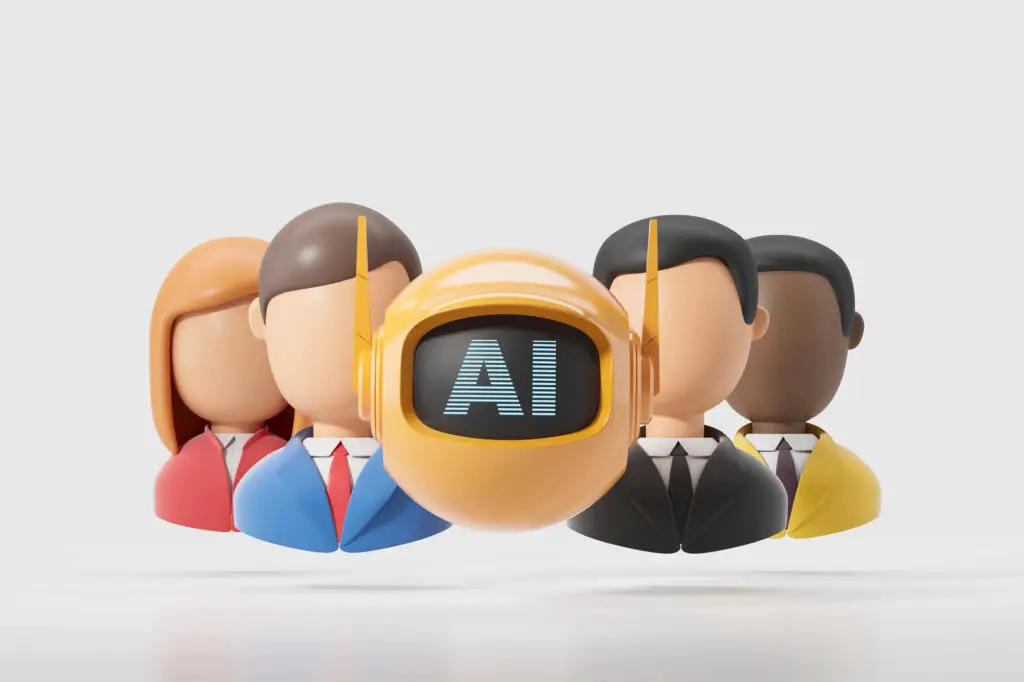 There’s been a lot of media focused on artificial intelligence—AI—being used to replace employees. While it’s true that some functions are now being handled by AI and that employees previously doing them have been axed, AI in the 21st century is probably no more that enemy of employees than machines were in the 18th and 19th centuries. AI will certainly cause disruptions and require retraining and redeployment of staff. A previous blog described 3 ways to grow your business using AI. This blog is focused on how AI impacts staffing.
There’s been a lot of media focused on artificial intelligence—AI—being used to replace employees. While it’s true that some functions are now being handled by AI and that employees previously doing them have been axed, AI in the 21st century is probably no more that enemy of employees than machines were in the 18th and 19th centuries. AI will certainly cause disruptions and require retraining and redeployment of staff. A previous blog described 3 ways to grow your business using AI. This blog is focused on how AI impacts staffing.
Staffing and AI
Using AI in the hiring process
- AI can be used in a variety of ways in the hiring process. Examples:
Find job candidates from job boards and social media - Screen candidates (assess skills, experience, etc. from resumes)
- Communicate with candidates for scheduling interviews
- Conduct preliminary interviews in which AI can assess a candidate’s strengths and weaknesses based on speech pattern, facial expression, and body language (yes, it’s scary)
- Do background checks
- Make or assist in hiring decisions
There may be legal limitations on how AI is used for the hiring process. On the federal level, there are as yet no laws regarding the use of AI in the hiring process. Still, some agencies have already weighed in and cautioned against potential discrimination from AI.
Some localities are already barring employers from using AI tools in a discriminatory manner:
- Colorado became the first state to make “algorithmic discrimination” unlawful. Algorithmic discrimination is “any condition in which the use of an artificial intelligence system results in an unlawful differential treatment or impact that disfavors an individual or group of individuals on the basis of their actual or perceived age, color, disability, ethnicity, genetic information, limited proficiency in the English language, national origin, race, religion, reproductive health, sex, veteran status or other classification protected under the laws of this state or federal law.” The law is effective on January 1, 2026.
- Illinois makes it unlawful for employers to use AI where the effect is discriminatory on the basis of protected classes. The same bar applies to using zip codes as a proxy for protected classes. The law is effective on January 1, 2026.
- New York City relying on AI to make employment decisions must conduct a bias audit to ensure its AI isn’t discriminatory. The law took effect on January 1, 2023.
Handling employees’ AI anxiety
The AI Anxiety in Business Survey found that 71% of employees are concerned about AI, and nearly half (48%) are more concerned now than a year ago. The anxiety is triggered by fears of unethical usage, legal risks, and perhaps most significantly, job displacement.
The Health Action Alliance offers 3 steps for alleviating employees’ AI anxiety:
- “Build a culture of transparency” by clearly communicating the company’s approach to AI.
- “Position AI as an additive” by showing how repetitive, menial tasks can be handled by AI so that employees can focus on more satisfying tasks.
- “Use this moment as an opportunity for continued skill development” by supporting up-skilling and retraining your staff (discussed next).
Training/up-skilling staff
The survey referenced earlier found that 67% of employees feared losing out on promotions for not knowing how to use AI and 66% were anxious about falling behind if they didn’t use AI at work. These fears and anxiety can be alleviated by helping employees to use AI. In fact, 80% said more training would greatly help.
Generative AI, such as ChapGPT, doesn’t require much training (if I could teach it to myself, then most anyone can do it). Other AI deployment within the company may require more extensive training. You can DIY; implement an AI feature and then train employees on how to use it. Alternatively, you can engage outsiders. Examples:
- Guild offers AI skilling bundles for employees and business leaders.
- TalentLMS offers access to training tools for a monthly fee.
Final thought
To repeat the thought of Ginni Rometty, former CEO of IBM:
“Some people call this artificial intelligence, but the reality is this technology will enhance us. So instead of artificial intelligence, I think we’ll augment our intelligence.”
Looking for more resources concerning AI and your business? Find a list of blogs here.


